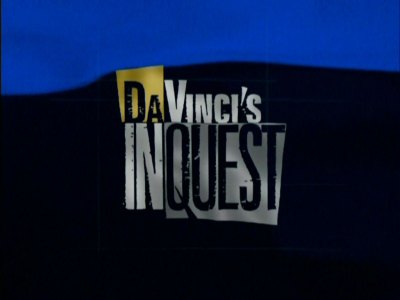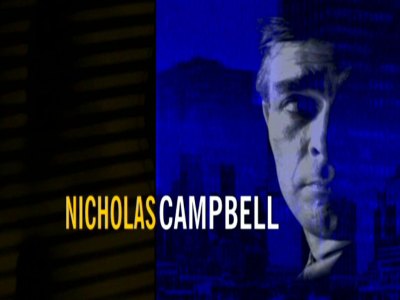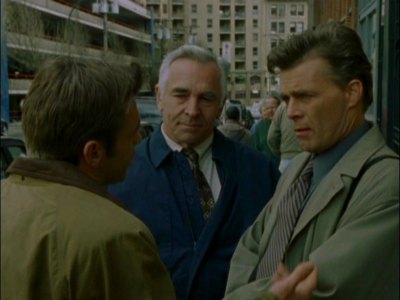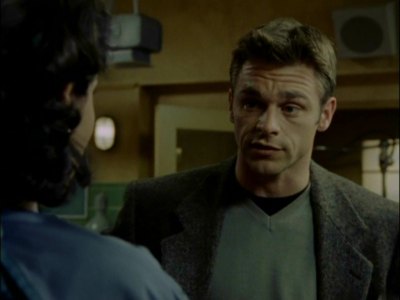| Reviews & Columns |
|
Reviews DVD TV on DVD Blu-ray 4K UHD International DVDs In Theaters Reviews by Studio Video Games Features Collector Series DVDs Easter Egg Database Interviews DVD Talk Radio Feature Articles Columns Anime Talk DVD Savant Horror DVDs The M.O.D. Squad Art House HD Talk Silent DVD
|
DVD Talk Forum |
|
|
| Resources |
|
DVD Price Search Customer Service #'s RCE Info Links |
|
Columns
|
|
|
Da Vinci's Inquest - Season 1
I'm now a full-blown fan of Da Vinci's Inquest, thanks to Acorn Media's four-disc box set of Da Vinci's Inquest: Season 1. I live close to the Canadian border, and I can pick up CBC regularly (I'm a big Coronation Street fan), so I remember all the buzz around Da Vinci's Inquest back during its premiere season in 1998. But having been burned on Canadian TV before (a sentiment echoed by many Canadians, as well), I stayed away. Man, was I wrong. Da Vinci's Inquest immediately hooks you in with its tightly written scripts, strong characterizations, and a refreshingly adult - but not exploitative - approach to its subject matter.

Da Vinci's Inquest: Season 1 introduces us to Dominic Da Vinci (Nicholas Campbell), a former cop and now Vancouver coroner with a lot of baggage. He's a constantly slipping alcoholic, who works with his ex-wife, Patricia (Gwynyth Walsh), a chief pathologist in Dominic's office. Dominic's boss, Chief Coroner James Flynn (Robert Wisden) is currently involved with Patricia, causing further friction between the three. Dominic's daughter, Gabriella (Jewel Staite), a teenager flitting between living with her mother and father, often challenges Dominic's role as a father. Dominic also has to deal with his aged father, Joe (Robert Clothier), who's suffered a stroke and who needs constant care now.
On the police side of Da Vinci's Inquest: Season 1, Det. Mick Leary (Ian Tracey), a sensitive, younger cop, is teamed up with old pro (and sometimes shady corner-cutter) Det. Leo Shannon (Donnelly Rhodes). Both have skeletons in their closets. Mick's brother Danny (Max Martini) is a drug dealer who's involved with some deadly thugs, while Leo has a wife who's mentally ill (she's only briefly introduced in this first season). Mick finds himself entering a tentative relationship with Sunny Ramen (Sue Matthew), a pathologist who works with Patricia, while Danny becomes involved with Leo and Mick's co-worker, Det. Angela Kosmo (Venus Terzo). All of these characters intertwine throughout the season, working together on individual cases, as well as carrying through on story arcs that continue throughout the thirteen episodes of this first season.
That's a nice dramatic device for Da Vinci's Inquest: Season 1, building suspense not only for each individual episode, but teasing the viewer to keep coming back in the hopes that cases alluded to at the beginning of the season, may be solved at the end. And to Da Vinci's Inquest: Season 1's credit, not all of the cases are solved (not something you usually see on American television). The stories don't always tie themselves up into neat little packages that allow the audience off the hook. Certainly, even if the actual facts of the case are used to nab a suspect, the moral issues brought up by the topical stories linger for the viewer long after the show ends. Issues such as elderly care, teen drug abuse, euthanasia, sex shop subculture, and teen suicides, are explored in this first season. Not preachy in any way, Da Vinci's Inquest: Season 1 cleanly incorporates its morality tales into the mysteries, and usually gives us both sides of the dilemma, and allows us to decide what's right and wrong.

A show like Da Vinci's Inquest: Season 1 needs an audience anchor, and Campbell's Da Vinci is a most unusual one. Of course, we've seen dozens of TV investigators, cops, and detectives who come from broken homes, and who have personal demons sitting on their shoulders (what happened to the relatively sunny disposition of say a Joe Mannix?). But Da Vinci is somewhat different. Whereas the show openly shows how Da Vinci's drinking directly and adversely affects his life (we see him go to AA meetings several times), there's no resolution to his drinking problem. In fact, he's often shown drinking on the show, with no apologies. And no one lectures him, either. You wouldn't see that on an American show, and if the American character did "slip," he'd pay for it with the scorn of his fellow co-workers or family. Not here. Much of Da Vinci's Inquest: Season 1 has that kind of laid back attitude, particularly when the coroners are working on their bodies. It's not a disrespectful attitude, but one of dispassionate professionalism. It struck me as much more realistic than some other similar shows I've seen. As well, the treatment of the actual bodies in the mysteries, while somewhat graphic, are in no way used in a sensationalistic way (as I've seen on that weekly snuff-fest CSI). The stories are key here; not the manner in which the bodies have been killed or tortured. And they're not put on display for our prurient interest. It's an adult, sophisticated approach for a potentially exploitative series.
The acting is tops in Da Vinci's Inquest: Season 1, too. I remember Campbell when he was getting some press back in the late 70s. There was some talk that he might be a face to watch when he showed up in some high profile movies like A Bridge Too Far and The Dead Zone. Whatever happened to his career (I understand he's quite active - and well respected - in Canada), he's perfect here as Da Vinci (which I also understand is based on a real person, Larry Campbell, who was a coroner and former mayor of Vancouver). Intense, brooding, and not overtly likeable (which is a welcome relief, as well), Campbell manages to take what has become a stock character - the emotionally wounded professional - and bring some new life to it. With a loose approach to his line readings (you'll hear an occasional Canadian "eh?" in his speech), Campbell is always entertaining as Da Vinci. The only other actor I recognized was Rhodes (he played Dutch on the ABC comedy Soap), and he's quite good, as well, taking a stock character - the gruff, slightly out-of-touch veteran who's broken some rules in his time - and making it his own. Of particular note, as well, is Tracey as Mick. Tracey has an ingratiating directness to his acting style that I found refreshing. This kind of character in an American show would be almost assuredly "cocky" by genetic design, but Tracey plays it cool and focused, and he's a welcome addition to the cast.
Da Vinci's Inquest: Season 1 isn't perfect by any means. There are perhaps one too many scenes of Da Vinci giving his police cohorts a lot of grief over their supposed indifference and bureaucracy. It's a standard plot device for typical cop and medical shows, and if one really thought about it, Da Vinci wouldn't have been around too long, threatening all those superiors, week after week. And while I like the ambiguity of some of the loose plot threads that are introduced (Da Vinci's daughter's problems), others are frustratingly vague and evidently left alone because of time constraints (Leo's wife briefly alluded to this season in just one episode). Still, there's some fine writing here on Da Vinci's Inquest: Season 1, as well as clean, expressive direction and intense, focused acting.

DISC ONE:
Little Sister Part 1, 2, & 3
A prostitute's body turns up in Vancouver Harbour, casting new light on old cases. Does she represent the latest victim of a serial killer who has stalked the city for years? And if so, how has he gone unnoticed? Da Vinci delves into the past, looking to link a string of seemingly unrelated deaths. But he meets resistance at every step -- from his ex-wife, who performed the original autopsies; from his boss, who ruled the deaths accidental; and from the lead detective, who resents having his work questioned.
The Quality of Mercy
After a television reporter breaks a story about suspected euthanasia, Da Vinci demands that she reveal her source and Detectives Shannon and Leary attempt to uncover more facts. The ethical implications of the case strike close to home, however, when Da Vinci's aging father suffers a debilitating stroke.
DISC TWO:
Known to the Ministry
An epidemic of fatal drug overdoses sends Da Vinci and Detectives Leary and Kosmo on a hunt for a dead addict's missing infant, as well as for the source of the killer heroin. The twisted trail winds from an informant to a couple of users but reaches an apparent dead-end -- two bodies, both suspected dealers, murdered execution-style.
We All Fall Down
Accident or arson? That is the question when a nursing home burns, leaving most of the elderly residents dead and one missing. Evidence of abuse further arouses Da Vinci's suspicions. Meanwhile, his parents' growing difficulties at home give the coroner a deeply personal perspective on the harsh realities of eldercare.
The Stranger Inside
Showing no obvious signs of foul play, a young woman's corpse is found in an underground parking garage. As the investigation proceeds, secrets upon secrets unfold, revealing a subculture steeped in sadomasochistic sex and apparently protected by political power.
DISC THREE:
Gabriel
Investigating the death of a street kid on the docks, Leary suspects that other boys had tortured the victim. But for Da Vinci, the case dredges up a long-ago failure. Determined not to repeat past mistakes, he pursues a suspect who might have the answer to what really happened to the boy.
The Most Dangerous Time
A raucous party ends tragically with the gunshot death of a 15-year-old girl. Another in a series of teen suicides, or something more sinister? Answers prove tough to come by when the teenagers turn uncooperative. Troubled by his own increasingly distant daughter, Da Vinci becomes driven to find the truth.
The Bridge
After a drinking jag in a bar one night, Da Vinci falls under suspicion in a hit-and-run that injures a homeless man. Like sharks attracted to blood in the water, old enemies begin circling the embattled coroner. Even as he tries to clear himself, Da Vinci investigates a mysterious skeleton found beneath the Burrard Street Bridge.
DISC FOUR:
Final Chapter
In preparing to speak at a prestigious conferences in Seattle, Da Vinci's ex-wife Patricia reexamines the case of a serial killer who preyed on prostitutes and wound up murdered himself. Her research reveals several discrepancies and uncovers new clues -- ones that seem to paint the police as perpetrators.
The Hunt & The Capture
Da Vinci joins forces with a San Francisco-based FBI investigator, Special Agent Charlotte Turner, to investigate a series of abductions and murders that crosses national borders. One abductee manages to escape alive, and detectives follow her trail to an isolated farmhouse, thinking they've broken the case. But Da Vinci faces an ethical dilemma as he attempts to extract information that might lead to other victims.

The DVD:
The Video:
The full-frame video image for Da Vinci's Inquest: Season 1 is crisp and sharp, with deep, rich, dark colors and true blacks. It's a very lush looking series, and it uses the Vancouver locales to good effect.
The Audio:
The Dolby Digital English 2.0 stereo soundtrack is surprisingly active; all of the dialogue is clear and fully rendered.
The Extras:
There's a trailer for the show included, as well as some text filmographies for the cast.
Final Thoughts:
Adult, sophisticated, with a hypnotic pull to its crisply written mysteries, Da Vinci's Inquest: Season 1 is a welcome addition to the standard medical/crime thriller genre. Topical subjects are treated in a non-exploitive manner, and the acting is first-rate. If you've never seen the show before (like me), Da Vinci's Inquest: Season 1 is the perfect way to get hooked on this great Canadian TV series. I recommend Da Vinci's Inquest: Season 1.
Paul Mavis is an internationally published film and television historian, a member of the Online Film Critics Society, and the author of The Espionage Filmography.


|
| Popular Reviews |
| Sponsored Links |
|
|
| Sponsored Links |
|
|
| Release List | Reviews | Shop | Newsletter | Forum | DVD Giveaways | Blu-Ray | Advertise |
|
Copyright 2024 DVDTalk.com All Rights Reserved. Legal Info, Privacy Policy, Terms of Use,
Manage Preferences,
Your Privacy Choices | |||||||













